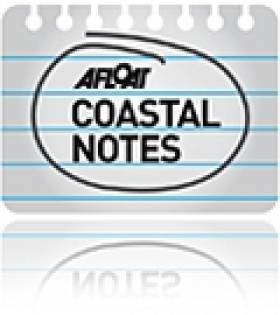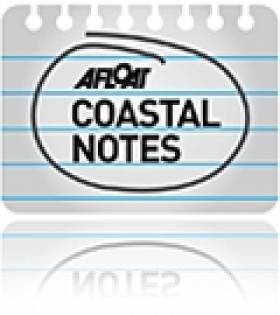Displaying items by tag: Eamon Ryan
Ireland is “ about five years behind other countries” on floating offshore wind, Simply Blue Group’s chief impact officer Dr Val Cummins has said.
Dr Cummins was responding to a reported call by Minister for Energy Eamon Ryan on fellow energy ministers to “get out of the way” of the renewable energy industry.
A Sunday Business Post report on Mr Ryan’s speech at the International Energy Agency (IEA)conference, which he chaired this week, referred to him calling for governments to “allow industry leaders and academics to deliver change at speed”.
A press release issued by Ryan’s department does not refer to him calling on governments to “get out of the way”, but quotes him as stating that that “it is time to “get down to business now” on delivering on commitments over the coming two years.”
The release says he urged that commitments on renewables “would be embedded and further developed at upcoming global events, including the G7 in Italy, the G20 in Brazil and the next COPS in Baku and particularly Brazil”.
National ministers from the IEA’s member countries have agreed to start discussions with India on the Indian government’s request to become a full IEA member, recognising the country’s “strategic importance” in tackling global energy and climate challenge.
 Minister for Energy Eamon Ryan
Minister for Energy Eamon Ryan
In an open letter to Ryan on Linked In, Dr Cummins says that “we don't have to wait for innovation in the years ahead”.
“Ireland is now about five years behind other countries on floating offshore wind. Demonstration arrays are currently deployed in Scotland, France, Portugal, Norway, Taiwan, Korea, Japan,” she writes.
“ Full commercial scale projects will come onstream in these countries, and others, by 2030. Therefore, the technology is ready,” she states.
“ However, Ireland is not. The Future Framework Consultative Document fails to provide a meaningful plan for getting floating offshore wind started. In its current form, it is much ado about nothing. We have to be honest when the Emperor has no clothes,” Cummins states.
“As for calling on energy ministers to 'get out of the way', the sudden u-turn, from a developer to plan-led approach to offshore wind in 2023 was ill-conceived in the absence of relevant expertise and experience in your department,”she says.
“ I have no doubt that the change was well intended, but it has increased uncertainty and jeopardised investment. The road the net zero is longer than ever. The production of Designated Marine Area Plans (DMAPS) have become a new policy bottleneck,” she says.
“In your speech you asked 'how do we develop floating offshore wind technology?' Quite simply, get the DMAPS done by Q1 2025. Commit to a timeline for stepping stone projects and develop a port for floating wind,”she says.
“Don't leave your words ring hollow. Engage with us. I am sure that industry, academia and civil society are poised and willing to help accelerate towards a just transition. We ask you to open the door to meaningful collaboration,”she says.
Dr Cummins’s open letter is on Linked In here
Mara to be Established by 2023, Ryan says, As He Opens Consultation on Maritime Area Consent Regime for Offshore Renewables
The State’s new maritime area regulatory authority (MARA) will be established and operational from 2023, according to Minister for Environment Eamon Ryan.
He said establishing MARA is “of the highest priority for Government” when he announced consultation on key aspects of the State’s new maritime area consent (MAC) regime for offshore renewable energy.
He said MAC will be a first step in a “new and streamlined planning process”.
Developers who have been assessed for, and are subsequently awarded, a MAC can then proceed to apply for development permission (planning permission), where they will undergo environmental assessment, he said.
This follows the enactment of the Maritime Area Planning Act on December 23rd, 2021.
The Maritime Area Planning (MAP) Act provides the legal underpinning for an entirely new marine planning system, he said, which will “strike a balance, between harnessing Ireland’s huge offshore wind potential and protecting our rich and unique marine environment”.
He explained that the MAC regime “will assess the viability of proposed offshore renewable energy developers in a number of key areas, including in respect of their financial and technical competency, in advance of developers proceeding to environmental studies”.
“The Maritime Area Planning Act is a transformational piece of legislation,” he said, which “provides regulatory certainty and the legislative underpinning for Ireland to embrace its abundant offshore potential”.
“Under the Act, the creation of a new MAC as a ‘first step’ in the planning process will ensure a fair and robust assessment of potential offshore renewable energy developers,” he said.
“ This will ensure that only the most viable offshore projects will have the opportunity to apply for development permission from An Bord Pleanála. At that point, they will undergo all the necessary environmental assessments,”he said.
“As Minister for the Environment, I will have the responsibility of inviting MAC applications from an initial batch of offshore renewable energy projects,” he said.
This would “represent a significant milestone in realising our ambitious climate targets of 5GW [Giga Watt] of installed offshore wind capacity by 2030 and a long-term plan to take advantage of a potential of at least 30GW of floating wind thereafter”, he added.
“After the assessment and grant of the first batch of offshore renewable energy projects, responsibility will be handed over to MARA, “he said.
This consultation on MAC regime “presents the proposed model for the assessment of the first offshore renewable energy projects”, he said, and “outlines important information on how [it] will operate”.
“Feedback received will help finalise the MAC assessment regime,” he said, with the first such consents expected to be issued in the second half of this year (2022).
The consultation will remain open for a period of four weeks until February 16th, 2022 and can be accessed here
Carey Courts Criticism Over Corrib Pipeline Approval
Controversy has arisen over the decision by outgoing Minister for Energy Pat Carey to grant key consents for the Corrib gas pipeline on the day of the general election.
According to the Irish Times, the Department of Energy said consent to construct the pipeline was issued "as a matter of course" after An Bord Pleanála approved the new pipeline route in January.
But Green Party sources told the paper that a recommendation on the consent application by Shell Ireland had not arrived on the desk of former Energy Minister Eamon Ryan before he left office that month.
Meanwhile, An Taisce is seeking a judicial review of the planning decision, which is believed to breach a number of EU directives.
As previously reported on Afloat.ie, planning for the last 8km stage of the Corrib pipeline - which runs through a special area of conversation - was only approved with 58 conditions related its construction and management.
Labour Party president Michael D Higgins told The Irish Times: “This is not a decision that one would regard as 'clearing one’s desk' as minister, as it has very serious implications."
The Irish Times has more on the story HERE.
Corrib Pipeline Go-Ahead Rests With Energy Minister
Energy Minister Eamon Ryan will issue a decision "in the coming weeks" on Shell Ireland's plans to complete the Corrib gas pipeline, The Irish Times reports.
The news follows yesterday's ruling by An Bord Pleanála which approved revised plans final section of the controversial pipeline.
Shell also requires licencing from Minsiter for the Environment John Gormley and the Environmental Protection Agency (EPA) for the completion of the pipeline under the conservation area of Sruwaddacon esturary to Shell's Ballinaboy gas terminal.
It would be a further two years before the pipeline is fully operational.
An Bord Pleanála's Inspector Martin Nolan commented that the "clarity and transparency" of Shell's revised application gave "confidence that the safety of the public is fully protected".
However planning was only approved with 58 conditions related to the construction and management of the 8.3km pipeline - including extra security at the landfall valve at Glengad, which has raised the ire of local residents at last year's oral hearings.
The Irish Times has more on the story HERE.































































